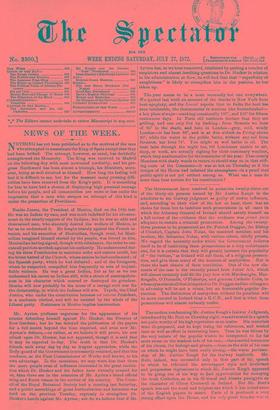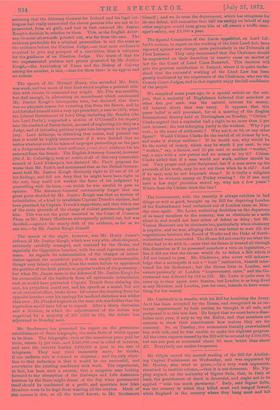The motion condemning Mr. Justice Keogh's Galway Judgment, introduced by
Mr. Butt on Thursday night, was advocated in a speech not quite worthy of his high reputation as an orator. His materials were ill-prepared, and he kept losing his references, and wasted time as well as effect in recovering them. Then he was driven by the very nature of the popular wishes he interpreted to lay far more stress on the weakest side of his case,—the asserted innocence of his clients, the bishops and priests,—than on the side of his case on which he might have been really strong,—the warm partisan- ship of Mr. Justice Keogh for the Galway landlords. Mr. Butt, indeed, was successful only in that part of his speech in which he ridiculed the extravagant style and irrelevant and purposeless digressions in which Mr. Justice Keogh appeared to be going out of his way to find opportunities for annoying the Irish Catholics, as in his ill-timed and bizarre panegyric on the character of Oliver Cromwell in Ireland. But Mr. Butt's speech was not the weak and helpless one which it has suited some of the English papers to assert. Parts of it produced a very strong effect upon the House, and his only great blunder was iu assuming that the Attorney-General for Ireland and his legal col- leagues had really exonerated the eleven persons who are not to be prosecuted, from all guilt, and had in fact reversed Mr. Justice Keogh's decision in relation to them. This, as the English Attor- ney-General afterwards pointed out, was far from the case. The evidence producible for a criminal prosecution is not the same as the evidence before the Election Judge,—so that more evidence is required to give any prospect of a conviction than is adequate for the guidance of an Election Judge. The worst of that for the unprosecuted prelates and priests presented by Mr. Justice Keogh,—the Archbishop of Tuain and the Bishop of Galway among the number, is this,—that for them there is no appeal and no redress.



































